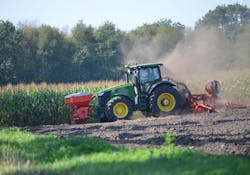Despite lingering uncertainties caused by COVID-19 and other factors, “there has been very strong demand for products in the ag market,” says Doug Kershaw, vice president of BKT USA Inc.
In this MTD exclusive, Kershaw discusses the impact of the pandemic on BKT’s North American ag tire business, the current state of ag tire demand in the U.S. and Canada and more.
MTD: How has the COVID-19 pandemic impacted your ag tire business in North America?
Kershaw: Overall, we are ahead of where we were a year ago at this time. It has been challenging to call on customers and work with them to build their businesses because of COVID-19-related restrictions.
The biggest challenge with COVID-19’s impact on worldwide business is the shipping industry disruptions with container shortages, freight increases, poor after-sales service and the pooling of resources by shipping companies.
This indirectly hurts the flow of raw materials to finished products. As far as BKT as a company, our ag team has remained fully intact. We remain focused on growth.
MTD: Can you describe the current state of overall ag tire demand in the U.S. and Canada?
Kershaw: There has been very strong demand for products in the ag market, but the challenge has been meeting that demand. We have a very strong and loyal customer base, so we work closely with them to help sell and stock the products they need.
Ag tire demand also has been influenced by government policies, with regard to the exporting of farm products, assistance given to farmers through farm bills and tariffs imposed on imported tires.
"Increased flexion (IF) technology and very-high flexion (VF) technology in tires are becoming more and more popular in order to be able to carry heavier loads without increasing soil compaction," says Kershaw.
MTD: What will 2021 look like?
Kershaw: We don’t feel that the first quarter will look much different than it does right now. If government policies remain the same, demand will remain strong.
It is very hard to say what the remainder of the year will look like at this point, as the advancements in the development of a COVID-19 vaccine will play a part. Weather conditions always have a huge impact on the industry. But worldwide markets - and the production and purchasing of agricultural products - will be a large factor, also.
MTD: What trends should ag tire dealers monitor as the new year begins?
Kershaw: Equipment is continuing to get larger and larger, carrying heavier and heavier loads. Increased flexion (IF) technology and very-high flexion (VF) technology in tires are becoming more and more popular in order to be able to carry heavier loads without increasing soil compaction.
“Also, with more equipment being driven on roads, more implement tires are moving from bias construction to radial construction and from a standard compound to a stubble-resistant compound to improve the life of the tire,” he adds.
About the Author
Mike Manges
Editor
Mike Manges is Modern Tire Dealer’s editor. A 28-year tire industry veteran, he is a three-time International Automotive Media Association Award winner, holds a Gold Award from the Association of Automotive Publication Editors and was named a finalist for the prestigious Jesse H. Neal Award, the Pulitzer Prize of business-to-business media, in 2024. He also was named Endeavor Business Media's Editor of the Year in 2024. Mike has traveled the world in pursuit of stories that will help independent tire dealers move their businesses forward. Before rejoining MTD in 2019, he held corporate communications positions at two Fortune 500 companies and served as MTD’s senior editor from 2000 to 2010.

